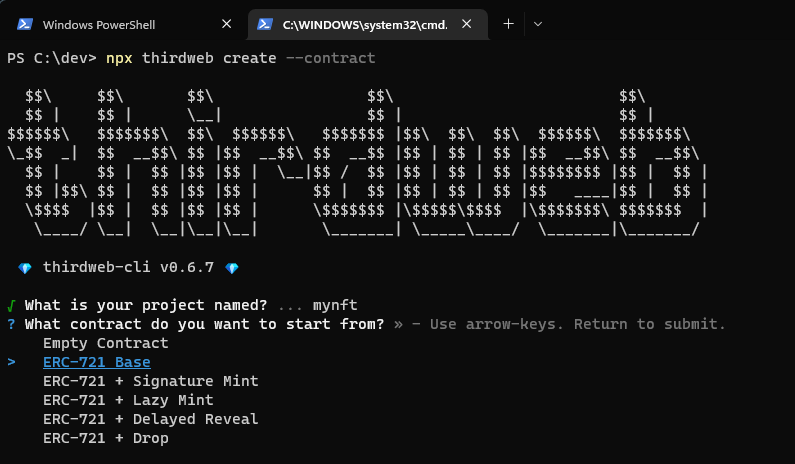Creating Custom Contracts
All the individual elements that make up our pre-built contracts are available in our Contracts SDK, for you to piece together various parts of our contracts and customize them to build your own!
This page will show you how to create and release your own ERC721A NFT collection.
Creating a Custom Contract
First, we can use the CLI to create a new project with a smart contract inside, and the Contracts SDK installed for us.
npx thirdweb create --contract
Using the CLI, we can simply select the base contract we wish to start from. Let's select ERC721Base:

Starting From A Base Contract
Once the project has been initialized, you can open it in your text editor and view the code for the contract.
Base contracts give us a great starting point with functionality already implemented for us.
You can see that for a contract to "start" as a base contract, such as the ERC721Base, we need to:
- Import the contract from the SDK.
- Inherit the contract, by saying
MyNFT is ERC721Base. - Implement any required methods such as the
constructor.
// SPDX-License-Identifier: MIT
pragma solidity ^0.8.0;
import "@thirdweb-dev/contracts/base/ERC721Base.sol";
contract MyNFT is ERC721Base {
constructor(
string memory _name,
string memory _symbol,
address _royaltyRecipient,
uint128 _royaltyBps
)
ERC721Base(
_name,
_symbol,
_royaltyRecipient,
_royaltyBps
)
{}
}
Add Contract Extensions
Base contracts work out of the box without any additional code required, but you might want to add additional functionality to your contract. To do so, we can write any custom logic or begin to implement additional contract extensions; such as Permissions, by following the same pattern as this contract does.
1. Import the contract from the SDK.
import "@thirdweb-dev/contracts/extension/PermissionsEnumberable.sol";
2. Inherit the contract, by saying MyNFT is PermissionsEnumberable.
contract MyNFT is ERC721Base, PermissionsEnumberable {
// ...
}
3. Implement any required methods such as the constructor.
// SPDX-License-Identifier: MIT
pragma solidity ^0.8.0;
import "@thirdweb-dev/contracts/base/ERC721Base.sol";
import "@thirdweb-dev/contracts/extension/PermissionsEnumerable.sol";
contract MyNFT is ERC721Base, PermissionsEnumerable {
constructor(
string memory _name,
string memory _symbol,
address _royaltyRecipient,
uint128 _royaltyBps
)
ERC721Base(
_name,
_symbol,
_royaltyRecipient,
_royaltyBps
)
{
// Give the contract deployer the "admin" role when the contract is deployed.
_setupRole(DEFAULT_ADMIN_ROLE, msg.sender);
}
}
Next Steps
Now we've written our contract, let's share it with the world!
Next, we'll learn how to use the CLI to create a versioned release of our contract, and then deploy it from the dashboard.